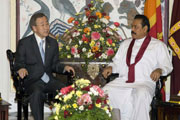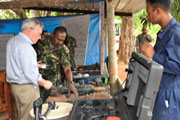
Ilankai Tamil Sangam
Association of Tamils of Sri Lanka in the USA
Published by Sangam.org
by UN News Centre, June 22, 2010
|
Today’s statement stressed that Mr. Ban “remains convinced that accountability is an essential foundation for durable peace and reconciliation in Sri Lanka. Through the panel the Secretary-General expects to enable the UN to make a constructive contribution in this regard.” |
 |
Secretary-General Ban Ki-moon (left) with President Mahinda Rajapaksa of Sri Lanka, on a visit in May 2009 |
Secretary-General Ban Ki-moon today appointed a panel of experts to advise him on accountability issues relating to alleged violations of international human rights and humanitarian law during the final stages of the conflict in Sri Lanka that ended last year.
The three-member panel will advise Mr. Ban on implementing the commitment on human rights accountability made in the Joint Statement issued by the Secretary-General and Sri Lankan President Mahinda Rajapaksa after the UN chief visited the island country in May 2009.
Indonesia’s Marzuki Darusman will serve as the chair of the expert panel, and the other two members are Yasmin Sooka of South Africa and Steven Ratner of the United States. The panel is expected to wrap up its responsibilities within four months of starting work.
The experts will examine “the modalities, applicable international standards and comparative experience with regard to accountability processes, taking into account the nature and scope of any alleged violations in Sri Lanka,” according to a statement issued by Mr. Ban’s spokesperson.
“It will be available as a resource to Sri Lankan authorities should they wish to avail themselves of its expertise in implementing the commitment. In the conduct of its mandate, the panel hopes to cooperate with concerned officials in Sri Lanka.”
Government forces declared victory over the rebel Liberation Tigers of Tamil Eelam (LTTE) last year after a conflict that had raged on and off for nearly three decades and killed thousands of people. The conflict ended with large numbers of Sri Lankans living as internally displaced persons (IDPs), especially in the north.
Today’s statement stressed that Mr. Ban “remains convinced that accountability is an essential foundation for durable peace and reconciliation in Sri Lanka. Through the panel the Secretary-General expects to enable the UN to make a constructive contribution in this regard.”
Last week B. Lynn Pascoe, the Under-Secretary-General for Political Affairs, visited Sri Lanka and held talks with Mr. Rajapaksa, senior Government officials, Opposition leaders and representatives of the Tamil and Muslim communities and civil society groups. He also visited conflict-affected areas where IDPs are being resettled.
Mr. Pascoe said that political solutions that tackle the underlying grievances which fuelled the conflict are necessary to heal the wounds left by the civil war.
--------------------------------------------------------------------------
New York, 22 June 2010 - Statement attributable to the Spokesperson for the Secretary-General on Sri Lanka
The Secretary-General has appointed a Panel of Experts that will advise him on the issue of accountability with regard to any alleged violations of international human rights and humanitarian law during the final stages of the conflict in Sri Lanka. Its members are:
Mr. Marzuki Darusman (Indonesia) - Chair
Ms. Yasmin Sooka (South Africa)
Mr. Steven Ratner (USA)
The Panel will advise the Secretary-General on the implementation of the commitment on human rights accountability made in the Joint Statement issued by President Rajapaksa of Sri Lanka and the Secretary-General during the latter's visit to Sri Lanka in May 2009. It will look into the modalities, applicable international standards and comparative experience with regard to accountability processes, taking into account the nature and scope of any alleged violations in Sri Lanka. It will be available as a resource to Sri Lankan authorities should they wish to avail themselves of its expertise in implementing the commitment.
In the conduct of its mandate, the Panel hopes to cooperate with concerned officials in Sri Lanka. It is expected to complete its advisory responsibilities within four months of the commencement of its work.
The Secretary-General remains convinced that accountability is an essential foundation for durable peace and reconciliation in Sri Lanka. Through the Panel the Secretary General expects to enable the United Nations to make a constructive contribution in this regard.
-----------------------------------------------------------------------------
Post-conflict solutions in Sri Lanka must tackle underlying issues – UN official
 |
UN Political Affairs chief, B. Lynn Pascoe, inspects mine equipment on visit to Mullaitivu District |
“Bitterness and division that took decades to accumulate will not dissolve overnight in Sri Lanka, but now is the time to make major efforts to begin healing those wounds,” B. Lynn Pascoe, Under-Secretary-General for Political Affairs, told journalists in the capital, Colombo.
The Government has taken measures since the war ended in May last year to show a shift away “from war footing to a peacetime mindset,” such as relaxing emergency decrees, but more opportunities could be taken to diminish the military presence in the former conflict areas.
“It is also critical to safeguard the independence of institutions, freedom of the press and the work of non-governmental actors,” said Mr. Pascoe.
The Under-Secretary-General held talks yesterday with President Mahinda Rajapaksa in what he termed a “good meeting,” before holding discussions with other Cabinet officials, including Foreign Minister G. L. Peiris and Attorney General Mohan Peiris.
He also met with leaders of the political opposition, Tamil and Muslim representatives, civil society organizations and members of the diplomatic corps.
In Mullaitivu, a northern town formerly controlled by the Liberation Tigers of Tamil Eelam (LTTE) and site of the final battles with Government forces, Mr. Pascoe said he saw local officials working “energetically on behalf of the returnees” who number some 60,000 in the camps and 90,000 living with host families.
“The United Nations appreciated the Government’s efforts thus far, supported by the international community,” Mr. Pascoe told journalists, commending UN efforts carried out under the leadership of UN Resident Coordinator Neil Buhne.
He praised the reopening of schools and access to food and basic health care, but said one of the biggest concerns is the lack of building materials to reconstruct homes.
Turning to accountability for the allegations of humanitarian and human rights violations during the conflict, Mr. Pascoe said that Government officials had assured him that the Lessons Learned and Reconciliation Commission “will provide Sri Lankans with a credible and independent accountability mechanism.”
While the Secretary-General intends to “soon” establish a panel of experts that will advise him on international standards and comparative experiences with accountability, “responsibility for carrying out a credible process” rests first and foremost with the Sri Lankan authorities.
This was Mr. Pascoe’s third visit to Sri Lanka since last year.
© 1996-2025 Ilankai Tamil Sangam, USA, Inc.